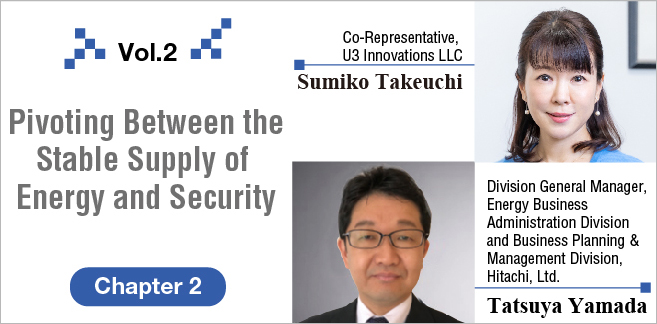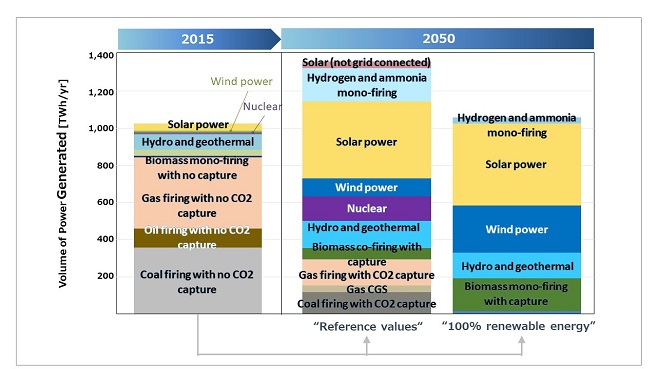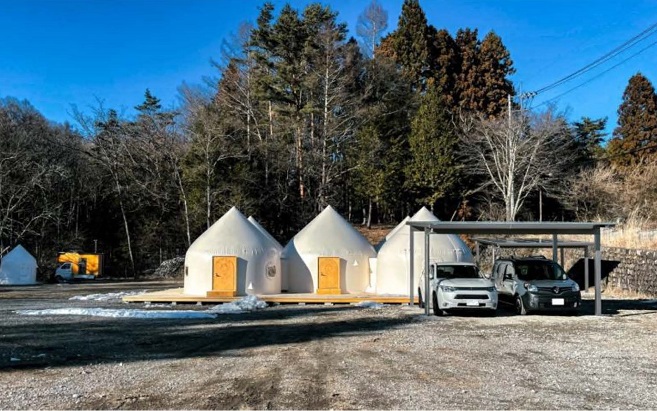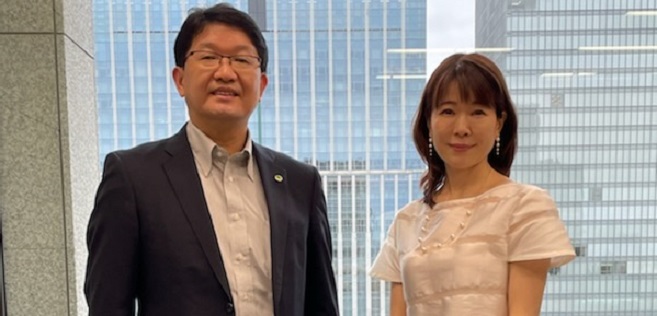
Diverse initiatives are currently underway to establish a carbon neutral society, but a mountain of problems that require innovation lie in the way of achieving it. In the series, Listening to Key Persons, Tatsuya Yamada, a Hitachi, Ltd. official in charge of policy proposals and new business development, asks experts and workers in the field about how they view the current situation surrounding the issues that need to be overcome to build a carbon neutral society and how they are moving toward solutions to them.

At the second meeting of the GX Implementation Council held on August 24, 2022, Prime Minister Kishida reversed the current policy of not considering the new construction or expansion of nuclear power plants, directing the consideration of next-generation power plant construction while announcing the restarting of seven nuclear reactors from summer next year. Behind this decision, as Ms. Takeuchi pointed out in part one of this discussion, is the acknowledgment that it will be essential to secure electric power in the medium to long term in order for Japan to achieve carbon neutrality by 2050. In part two of this discussion, we asked about the importance of nuclear power due to the situation in Japan, and the respective roles of energy providers and startups in the promotion of GX.
Yamada:In part one, I asked you about the severe situation in which the Japanese energy environment finds itself. Under these conditions, and in response to the current energy crisis, the government has also begun moves to research nuclear power generation. Opinion polls show that 70% of the public support the restarting of nuclear reactors (polling by Nikkei Shimbun in August 2022).
If we turn our attention to the past, it was nuclear power that stably supported the increase in demand for electric power during Japan's high economic growth period. While renewable energy has great value in terms of being "green," there still remains serious challenges in terms of the burden on power grids and the adjustments that take place. In fact, before the Great East Japan Earthquake, Japan benefitted greatly from nuclear power. Towards achieving carbon neutrality, I think there is a need to reassess the value of nuclear power and utilize it, but I am interested in what you think about this.
Takeuchi:Japan's Atomic Energy Basic Act was established in 1955. The fact that Japan strengthened its resolve to utilize nuclear power just ten years after experiencing the horror of having two atomic bombs dropped on its cities speaks to its thirst for the cheap and abundant energy that nuclear power provides. Japan had been forced to launch the Pacific War because it was cut of from procuring oil, and I think Japan resolved that securing energy was essential for its survival. Other countries came to similar conclusions. When France initially pursued the introduction of nuclear power, it reflected the will of its people to leave the fate of the country in the hands of its scientists rather than Middle Eastern countries and their oil fields.
While there was a temporary lull in the development of nuclear power due to stagnating economic growth and power deregulation in Europe and the United States, the need for nuclear power has been reaffirmed due to policies to combat global warming. When the Great East Japan Earthquake struck, I was working at TEPCO, and at the time under the Democratic Party of Japan-led administration, there were national plans to expand nuclear power as a part of efforts to combat climate change. Back in 2010, the government had set the goal of building 9 new reactors in 10 years, and 14 reactors within 20 years, but there was strong criticism of the plan as unrealistic from among the electric power companies that would be responsible for running those businesses. As you know, it takes a very long time to gain the understanding of local residents regarding the construction of nuclear power facilities. In fact, it took 45 years from the time the resolution was made to invite a company to construct a nuclear power plant until the Higashidori Nuclear Power Plant in Aomori Prefecture was completed.
But we have to stick with the global warming targets the Prime Minister declared at the United Nations. At the time of the earthquake, my job was to prepare a report on a Joint Crediting Mechanism*1. This is based on the idea that if nuclear power plants were constructed overseas using Japanese nuclear power technologies, it would be necessary to determine how much CO2 emissions would be reduced as a result, and to have as much as half of those reductions assigned to Japan.
Nuclear power efforts that were proceeding along those lines were abandoned all at once in the wake of the accident at the Fukushima nuclear power accident. Of course, since a serious accident of that magnitude had occurred, there was a need for serious reflection and policies had to be revised. However, nuclear energy was introduced in Japan because it was necessary for Japan to survive in the world. Nuclear power is hard work. It's hard work for policy officials, for business operators, and for the local residents near existing or proposed power plant sites. But we did it because it is necessary. A shift away from nuclear power can free us from the risks associated with the use of nuclear power, but on the other hand, that exposes us to the risks of not using nuclear power. I worry that discussion is taking place without adequately conveying those risks of going nuclear-free, and when I realized that someone needs to communicate those things, however reckless the decision may have been, I became an independent researcher.
Yamada:As simulations conducted by the H-U Tokyo Lab has revealed, nuclear power is essential to achieving carbon neutrality by 2050, and even now we are falling short. There are also concerns about technological transfer with no development of young engineers in the field while nuclear power is paused.

Power source composition in Japan based on the RITE report: 2015 and 2050
Source: H-U Tokyo Lab, "Proposal Toward Realizing Energy Systems to Support Society 5.0" (Version 4),
March 24, 2022
Takeuchi:In the sense of passing on technologies and securing human rights, the timing is quite precarious at the moment. I think we have to face nuclear power once again in order to restart operations.
Takeuchi:However, at the moment it is extremely hard for the energy supply side to make investment decisions. Particularly in the deregulated market, starting up a nuclear power investment project is unfeasible due to financing cost issues. One of the reasons it is difficult to make energy supply-side investment decisions in the uncertainty in the outlook for electricity demand. Electricity demand is proportional to economic growth and population. At the current rate of electrification, electricity demand will fall by 20% by 2050. But if progress is made in the electrification of energy demand as a measure to combat global warming, then more vehicles and hot water systems will be run by electricity, and electricity demand will increase. Although it depends on the intensity of global warming measures, the Research Institute of Innovative Technology for the Earth (RITE) estimates that demand could increase by up to 1.5 times. Depending on the strength of policies implemented, demand could be 0.8 times or 1.5 times of what it is now. That's a gap where the former is roughly half of the latter possibility.
Renewable energy is related to the role of national land use. Land suitable for solar power is limited, and while there are high hopes for offshore wind, wind conditions (its direction, speed and other characteristics) are not as favorable in Japan as Europe. The topography of the seabed is another factor that makes it considerably difficult to reduce costs. Nuclear power is essential for achieving decarbonization, and it is clear that we can't have it both ways in achieving decarbonization and shifting away from nuclear power at the same time.
Yamada:As you say, the paths available to Japan are limited. Perhaps what remains is the combination of digital technology and the energy industry. In the sense of pursuing businesses that could be winning strategies for Japan, I believe it will be necessary to utilize smart meters installed in nearly every household to implement proper energy management and build wide-area network infrastructure. I think utilizing those advancements will enable the development of various services, such as energy conservation programs and demand response mechanisms.
2050 Future Vision
Source: Hitachi Social Innovation Forum 2021 JAPAN Expert Session - Energy Systems for Carbon Neutrality and Hitachi's Vision of a Sustainable Future
Takeuchi:That is an important thing to point out. To link those services with the decarbonization of power generation, the use of storage batteries and hydrogen will be essential. The winning factors in those endeavors will be cost and ease of use.
And on the regulatory side, carbon taxes and carbon pricing should be introduced. Those schemes put a price on external diseconomies. However in that case, I think we would need to introduce large-scale carbon taxes after reviewing the existing tax schemes and systems in place, including the feed-in tariff system for renewable energy.
Yamada:In part one of this discussion, you were saying that creating added value is an important factor whether GX will be achieved or not, and that new players such as startups are essential.
Takeuchi:I think that there should be a division of roles between energy providers and general electronics manufacturers like Hitachi, who have supported the energy industry for many years, and entities such as venture companies and startups. That's because in the energy sector is a world in which even one mistake out of 100,000 is not tolerated. On the other hand, startups are characterized by their mobility, and by improving accuracy through trial and error, the development of products and services can be sped up. Therefore, there are extremely high hurdles standing in the way of startups entering the energy industry. In even, the public listing of an energy-related startup occurs around once every two or three years.
But to make GX a major revolution that raises people's level of wellbeing, added value must be created, and that means the participation of new players is essential. I think we can create a new industry itself by doing that.
In conjunction with my work to make policy recommendations as a researcher, I founded U3 Innovations LLC to shape a Utility 3.0 world. U3 Innovations, working on a joint basis with LIFULL Co., Ltd., has currently established Off-grid Living Lab Yatsugatake, a facility in Hokuto, Yamanashi Prefecture for conducting living demonstration activities towards realizing a completely off-grid living environment, and demonstration testing has been underway since March 2022. We hope to find solutions to climate change and provide alternate means for infrastructure associated with the decline in regional populations. In terms of specifics, we have built instant homes at the foot of Mt. Yatsugatake and are utilizing a complete water recycling system apart from drinking water, solar power generation, storage batteries and other technologies to identify the issues for off-grid living. Honestly, the elemental technologies are already available. We are packaging all the technologies from the standpoint of supporting daily life, and then refining the operations. That makes it very difficult to create something that is comparable to existing infrastructure in terms of ease of use and cost.

Off-grid Living Lab Yatsugatake
(Hokuto-city, Yamanashi Prefecture)
Yamada:That's the kind of forward-thinking challenge that venture companies are known for.
Takeuchi:Yes, it is. As for energy producers, I think they will consider entering the infrastructure market. But it is not possible to enter the infrastructure market with technologies that are still in the process of being hammered out. It is necessary to find a market in which the technology at hand can be refined. For our part, we will start by entering the glamping*2 market, and then expand into other markets like holiday homes and disaster preparedness, in order to gradually develop our offerings as goods and services that contribute to distributed energy.
Yamada:Large corporations including energy providers engage in excessive risk management and are not good at taking on new challenges quickly.
Takeuchi:Indeed. It took only 3-4 months from when we first starting talking with LIFULL to the opening of the demonstration site at Yatsugatake (laughs).
However, energy providers still need to be responsible for large and centralized power sources, and we will expand the possibilities of distributed energy sources. This is truly a division of roles. Within that context, what we ask of Hitachi is to break away from a self-sufficient approach and collaborate with startups and other partners. If you are interested, we encourage you to take a bite and get on board. The reliable technologies and trust that has been built up over many years should be used to benefit the development of distributed energy in addition to large-scale centralized energy.
And lastly, I hope that in its capacity as a nuclear power generation manufacturer that contributes to the world, that Hitachi will continue to pass on its technologies while supporting GX.
Yamada:We will keep that in mind. Today we spoke about everything from government policy to the potential for next-generation distributed energy, and I was able to gain all kinds of insight. Thank you for spending time with us today.

Sumiko Takeuchi
Director, International Environment and Economy Institute / Specially Appointed Professor (Visiting), Tohoku University / Co-Representative, U3 Innovations LLC.
Obtained doctorate (Engineering) from the School of Engineering, The University of Tokyo.
After graduating from the Faculty of Law, Keio University, she mainly worked in the environmental department of Tokyo Electric Power Company before going independent.
She serves as a researcher at several think tanks and is also a member of many policy committees, including the Cabinet Office's Council for Regulatory Reform and GX Implementation Council.
She has also long participated in international negotiations on climate change (COP), and continues to take a macro view of environmental and energy policies while making policy proposals that are grounded in reality and field-level insight. In October 2018, she co-founded U3 Innovations LLC with Takeshi Ito. U3 Innovations aims to collaborate with startups to realize Utility 3.0 as a new social system, and tackles its goals in terms of both policy recommendations and business.
Her major publications include "The Truth of Energy Policies" (Published by WEDGE), "Energy Industry in 2050 - Game Change to Utility 3.0" (Published by Nihon Keizai Shimbun), and "Energy Industry Strategy for 2030" (Published by Nihon Keizai Shimbun).
Tatsuya Yamada
Division General Manager, Energy Business Administration Division and Business Planning & Strategy Division, Hitachi, Ltd.
Yamada joined Hokuriku Electric Power Company in 1987, and was seconded to The Institute of Energy Economics, Japan in 1998 before joining Hitachi, Ltd in 2002.
He has engaged in tasks involved in the planning of strategies for energy-related businesses, and became Director of the Management Planning Office, the Strategy Planning Division in 2014, Senior Manager of the Business Planning Division, the Energy Solution Business Unit in 2016, General Manager of the Business Planning Division, the New Age Energy Business Co-create Division in 2019, and assumed his present positions in 2020.